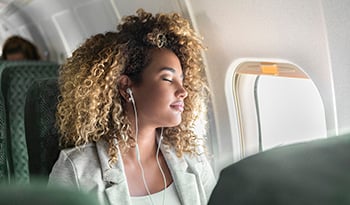Tips for Staying Healthy Through Jet Lag
ВІДМОВА ВІД ВІДПОВІДАЛЬНОСТІ:Цей блог не призначений для встановлення діагнозу...

By Taz Bhatia, MD
Traveling, especially internationally, is fun! But the jet lag that almost always accompanies it? Not so fun. Jet lag is real and can throw off your entire sleep cycle to such a degree that your health is placed at risk. It can happen even with the slightest change in time zones.
Jet lag can be especially tricky when you’re traveling with young children, who tend to have stricter bedtime routines in the first place. As a mom, I’ve learned through the years that family vacations can become disastrous when my kids’ sleep schedules are thrown off. One thing I like to remind moms and dads is that when their kids are jumping on the hotel bed at 10 p.m. because it feels like 3 p.m. back home, their own sleep suffers too—and they’ll still have to be bright-eyed and bushy-tailed the next day when the little ones are impossible to pull out of bed.
While it might seem totally harmless—and, yes, you will eventually recover and adjust back to sleep habits that feel more natural—you (or your health) shouldn’t have to suffer in the interim. Here are some tricks of the trade for staying healthy through jet lag and minimizing its effects.
Get as much sleep before your trip as you can
As early as a month before a big trip, pay close attention to how much sleep you’re clocking every night. Hint: It should be no less than 8 hours every 24 hours. If you’re a new mom, this might not be 8 consecutive hours (or 8 at all, let’s be honest!), but no matter your hectic schedule, try your best to get as much sleep before takeoff as you can. This will give you the greatest chance of warding off the side effects of jet lag before they even begin.
Pack melatonin
You don’t have to be traveling internationally to benefit from the sleep-inducing effects of melatonin! Your body naturally produces melatonin at night, but when your internal clock is in a state of confusion, it doesn’t make melatonin at the right times. The easy fix for this is to simply supplement with melatonin. Not only does melatonin decrease the time it takes to fall asleep, but it helps you stay asleep longer. It also increases REM sleep (that’s the deep sleep when you dream). Melatonin can be beneficial to try for adults. For little kids, try some tart cherry juice, which naturally contains melatonin. One study, published in the European Journal of Nutrition found that drinking tart cherry juice significantly increased the length and efficiency of sleep sessions.
Order Tryptophan-rich Foods at Dinner
This biochemical precursor to serotonin helps you maintain a healthy sleep cycle even when your internal clock is out of sync. When you’re out to dinner, whether it’s a few hours after landing or the next day, order foods rich in tryptophan such as shrimp, salmon, turkey, beans and nuts like almonds, walnuts, cashews and peanuts.
Rub your feet with magnesium oil
It might sound strange, but a good magnesium-oil foot rub is just the ticket to help you (and your little ones) wind down around bedtime. Magnesium is a natural muscle relaxer, so it not only takes the edge off the physical demands of travel, but it helps soothe you into a quiet and peaceful sleep. I love to massage a little magnesium oil into my children’s feet at night. It’s a calming bedtime ritual that we all look forward to. After applying and letting it sit for 10–20 minutes, remove the oil with a wet washcloth. Some kids will notice a tingling or burning sensation from the oil, which may be due to skin sensitivity or magnesium deficiency. If this happens, simply dilute the oil with water. Or try magnesium lotion, which is not as concentrated as the oil.

 Автор: Доктор Таз Бхатія, доктор медичних наук
Автор: Доктор Таз Бхатія, доктор медичних наук


